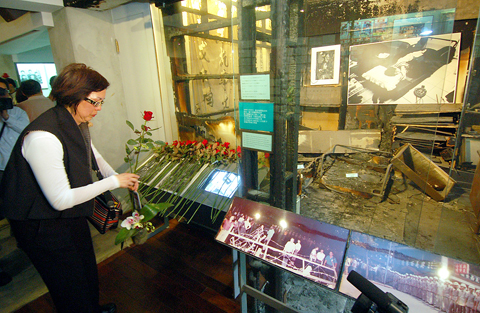Through board games, drama, debates and field trips, teachers who yesterday won a human rights curriculum design award want more elementary and high school students to get a firsthand idea of the abstract concept of human rights.
“I was shocked when I first walked into this place, and I think my students will feel the same, too,” said Tsai Ming-huang (蔡銘晃), a civic education teacher at Taipei Municipal Fuxing Senior High School, as he described how he felt when he first visited the well-preserved site where late human rights activist Deng Nan-jung (鄭南榕) set himself aflame in 1989 to protest the lack of freedom of speech under the authoritarian rule of the Chinese Nationalist Party (KMT) regime at the time.
The award ceremony was held there yesterday.

PHOTO: LO PEI-DER, TAIPEI TIMES
Tsai worked with his colleague Kuo Wen-ying (郭文瑛) to design one curriculum about the site and another on the 228 Memorial Museum — both of the designs won recognition.
“A major problem that we often run into when we teach students about human rights is that it’s a very abstract idea,” Tsai said. “But here, everything is so well preserved that as you walk into this place, you feel you’ve traveled through a time warp and can actually feel the atmosphere.”
While Tsai and Kuo’s curriculum focused mostly on visiting sites where actual historic events took place, four teachers from Anshun Primary School in Tainan worked together to incorporate field trips, drama, debate and even a board game modeled after Monopoly into the curriculum they designed.
“We realized in class that kids today know 228 Day more as a holiday and don’t often have a good idea about what the 228 Incident was,” said Tseng Kui-feng (曾桂鳳), one of the teachers. “So we decided that maybe we should take the kids to places where things actually happened and tell them the stories.”
However, as Tseng and her team started to work, different ideas popped up.
Tseng’s colleague, Chen Ping (陳稟), who had taken part in drama training, wrote a short play featuring fighting between different animals in a park to show the boundary between freedom and abuse of freedom.
Huang Mei-hua (黃美華), another teacher on Tseng’s team, created a board game in which players would be asked a question related to human rights each time they moved to a new block.
To show how the human rights issue was not something “far away,” Tseng asked students to debate on whether parents should be allowed to read their children’s letters without permission.
Tsao Chin-jung (曹欽榮), a member of the Truth and Reconciliation Association, said that it was important to teach about human rights to prevent repeating the mistakes of the past.
“It’s been only 20 years since Deng set himself on fire — is it a long time? No, it’s not, but it’s long enough for our younger generation born after martial law was lifted to not know about it,” he said. “That explains why we need to start [teaching about human rights] now.”

An essay competition jointly organized by a local writing society and a publisher affiliated with the Chinese Communist Party (CCP) might have contravened the Act Governing Relations Between the People of the Taiwan Area and the Mainland Area (臺灣地區與大陸地區人民關係條例), the Mainland Affairs Council (MAC) said on Thursday. “In this case, the partner organization is clearly an agency under the CCP’s Fujian Provincial Committee,” MAC Deputy Minister and spokesperson Liang Wen-chieh (梁文傑) said at a news briefing in Taipei. “It also involves bringing Taiwanese students to China with all-expenses-paid arrangements to attend award ceremonies and camps,” Liang said. Those two “characteristics” are typically sufficient

A magnitude 5.9 earthquake that struck about 33km off the coast of Hualien City was the "main shock" in a series of quakes in the area, with aftershocks expected over the next three days, the Central Weather Administration (CWA) said yesterday. Prior to the magnitude 5.9 quake shaking most of Taiwan at 6:53pm yesterday, six other earthquakes stronger than a magnitude of 4, starting with a magnitude 5.5 quake at 6:09pm, occurred in the area. CWA Seismological Center Director Wu Chien-fu (吳健富) confirmed that the quakes were all part of the same series and that the magnitude 5.5 temblor was

The brilliant blue waters, thick foliage and bucolic atmosphere on this seemingly idyllic archipelago deep in the Pacific Ocean belie the key role it now plays in a titanic geopolitical struggle. Palau is again on the front line as China, and the US and its allies prepare their forces in an intensifying contest for control over the Asia-Pacific region. The democratic nation of just 17,000 people hosts US-controlled airstrips and soon-to-be-completed radar installations that the US military describes as “critical” to monitoring vast swathes of water and airspace. It is also a key piece of the second island chain, a string of

The Central Weather Administration has issued a heat alert for southeastern Taiwan, warning of temperatures as high as 36°C today, while alerting some coastal areas of strong winds later in the day. Kaohsiung’s Neimen District (內門) and Pingtung County’s Neipu Township (內埔) are under an orange heat alert, which warns of temperatures as high as 36°C for three consecutive days, the CWA said, citing southwest winds. The heat would also extend to Tainan’s Nansi (楠西) and Yujing (玉井) districts, as well as Pingtung’s Gaoshu (高樹), Yanpu (鹽埔) and Majia (瑪家) townships, it said, forecasting highs of up to 36°C in those areas